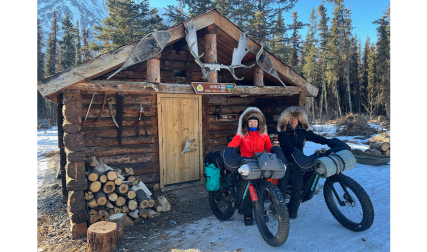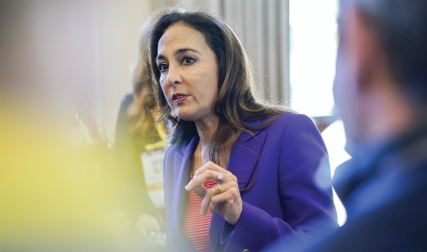State of Departments Your July/August cover story by C.J. Hughes ’92 [“Supply and Demand”] offered an extremely insightful description of the department of economics, which I enjoyed especially because neither was I an economics major nor did I take a single econ course during my four years in Hanover.
I’m wondering if DAM will make this article the first in a series profiling some of the other popular departments?
Brian C. Chao ’09 Millbrae, California
Editor’s Note: DAM previously profiled the geography department (“A World of Difference,” May/June 2009) and will likely check in on other departments periodically.
What’s in a Name? Although I can appreciate Jan van der Marck’s perception of the sculpture outside Wheeler (Thel) as “a whale rising from the ocean’s depths” [“Art Al Fresco,” July/Aug], as a former resident of Wheeler I still prefer buildings and grounds’ much more evocative nickname: The Plane Crash.
Tony Stearns ’86 Alameda, California
Hot Topic Scott Brown ’78 [“Going Nuclear,” Mar/Apr] is exactly right and deserves a lot of credit for both changing his mind in light of new facts and speaking out on the subject. There is simply no reasonable short-term alternative if we are to stop burning coal.
I urge you to read James Hansen’s Storms of My Grandchildren for a succinct update on global warming and the options we have to do something about it. Hansen, head of Goddard Space Center (NASA), is arguably the world authority on the combination of climate change and policy alternatives.
Buster Welch ’63 Clandeboye, Manitoba
The letter from Arno Arrak ’51 in the May/June issue claiming that global warming is based on “voodoo science” prompted me to think back to how science and logic were taught in the early 1950s when I was at Dartmouth.
Although carbon dioxide (CO2) is not the only greenhouse gas in the news, it’s the one that gets the most attention, and we know where almost all of it in the earth’s atmosphere comes from: the burning of fossil fuels by us humans. Secondly, we know that the concentration of CO2 in the earth’s atmosphere has been increasing without letup since the time of the Industrial Revolution and is doing so now at a dramatically accelerating rate. Thirdly, we know that much of the ultraviolet radiation from the sun that reaches the earth’s surface is reflected back out in the infrared frequency range. Finally, we have known from laboratory demonstrations since the late 1800s that CO2 absorbs infrared or heat energy and holds on to some of it.
If any of these statements, which seem pretty simple to me, are voodoo science, I will stand corrected. But if they are facts beyond dispute, the conclusion that follows from them is inescapable. Increasing amounts of CO2 in the air that surrounds us all will hold on to more and more of the reflected energy that came originally from the sun. More and more heat will be trapped rather than escaping into space.
While I don’t have any textbooks from my undergraduate days to check my thinking against, it seems to me that under such conditions the planet is going to keep warming up—indeed it must. And the evidence that this is happening is all around us.
Anthony Newey ’56 Walnut Creek, California
Pride and Prejudice Thank you for your interview with Hank Paulson ’68 by Jake Tapper ’91 [“After the Crash,” Mar/April]. I write from my country, Uganda—for the first time ever to DAM—just to say how sorry I am not to have met Hank when we were together at Dartmouth and later in D.C., where I worked for the World Bank before retiring.
I also write to let Dartmouth and the world to know that Dartmouth is proud of an athlete, an intellectual, an economist of unprecedented proportion, not to mention a great politician whom I was happy to see followed by another Dartmouth graduate.
I extend my warm thanks to both Paulson and Tapper not only for what they continue to do for America but also for the world.
Frank A. Mwine ’67 Kampala, Uganda
Aren’t some alumni with functioning central nervous systems outraged at your futile attempts at lionizing Paulson and Tim Geithner ’83, the predatory Wall Street thieves who caused the meltdown in the first place? Cancel my B.A. and my association with Dartmouth.
Don Richardson ’52 Brevard, North Carolina
Expand the Brand I can only heartily agree with the letter from my learned classmate W. Peter Cornish ’63 [“Letters,” Mar/Apr] when he says the Dartmouth “brand” needs to be upgraded beyond its envious standing in the U.S. News & World Report ranking of undergraduate teaching.
Athletic success, especially when obtained within the Ivy League, is critical to this effort. Obviously, as bright as he is, President Kim understands this concept. Although the College is experiencing serious budget issues, it can certainly improve its overall athletic standing.
This would convey excellence on a balanced front to our marketing target and not in just comparative narrowly defined fields. We have to overcome the unwarranted cachet that the HYP triumvirate has obtained over the years. Only a concentrated effort over several years will do the job.
William R. Wellstead ’63 Lakewood Ranch, Florida
O, Pioneers It might be of interest to note that there was actually an earlier, admittedly very much smaller, outing club than the current one celebrated in your Nov/Dec 2009 issue. In Baker Library there is a photograph of four undergrads titled “The First Dartmouth Outing Club” and subtitled “The four who climbed Cardigan in 1888 and became the Cardigan Snow-Shoe Club.”
Notes I have indicate the climb of Mount Cardigan took place on March 10, 1888. The four climbers are identified as C.P. “Ike” Anderson, class of 1889; B.S. “Rufus” Simonds, class of 1888; W.S. “Sully” Sullivan, class of 1889; and F.L. “Father” Pattee, class of 1888. Benjamin S. Simonds was my grandfather. The nicknames were probably used just within the group, since I have no record that my grandfather was ever commonly known as Rufus.
Donald M. Simonds ’54 Kensington, Maryland
Moral Compass I thoroughly enjoyed reading Bernie Gert’s reflections on his decades at Dartmouth [“Examine Assumptions,” Mar/Apr 2009]. After 25 years of practicing neurosurgery, all the biochemistry I studied at Dartmouth is now mostly obsolete and almost completely forgotten. In contrast, lessons from Professor Gert’s class on morality help me make clinical decisions and teach ethics to medical students almost every day.
Daniel Galyon ’78 Binghamton, New York




